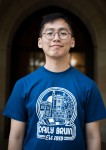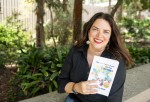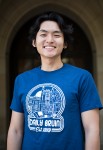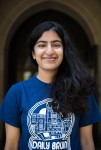If I’m not talking about UCLA UniCamp, then you’ll probably find me talking about Daily Bruin.
If you met me four years ago, I probably wasn’t talking at all. I was a painfully shy first-year, who wanted so badly to be comfortable in an environment where she enjoyed the presence of the people around her and the work she did. I worked hard to stay involved, taking on extra Design shifts at The Bruin, signing up for projects, attending every UniCamp meeting and eventually applying for leadership positions. I found myself in an editor and a leadership position, and soon enough, first-year me was hardly recognizable.
For the past four years, every ounce of my time and energy has been dedicated to these two organizations and spent trying to figure out how much sleep I can squeeze in between. If I wasn’t in the office, then I was probably off running meetings for camp or eating at Marugame Udon with my Design children, Callista Wu and Ed Qiao. Because I was always rushing from one place to another, I often times forget to pause and appreciate the people and environment around me.
It wasn’t until I started to clean and pack up my apartment that I began to realize how significant my time at The Bruin has been. I found a few forgotten items that reminded me of some of these special moments.
A watermelon slicer. I was gifted that by my team of assistant Design directors at the end of my third year. I made my first impression as a Design director with a watermelon. Right before that school year started, we had editor’s training and I housed a few editors at my apartment. Every day, I’d cut watermelons for them like how a mother cuts fruit for her kids. All I wanted was to create a warm and welcoming space, one similar made for me when I first joined Daily Bruin. I found that the way to many people’s hearts and friendships was food. From then on, I continued to create an inviting space for every designer who joined my section and built a family in the office through those efforts.
I applied to be the PRIME art director with two goals in mind – rebrand the magazine and redesign its logo. PRIME’s design hasn’t change much, with the logo remaining identical to the one used on its first issue back in November 2008. It took many revisions and doubts to make sure the redesign was what me and my co-editors wanted for our era of PRIME. The result was a bolder logo and a refreshing design, and I encouraged designers to not be afraid to do the same with their layouts. The release of the first issue with the new brand received many positive feedback from current staffers and alumni. Leading a redesign may have been the most daunting task I took on during my time at The Bruin, but the result was also the most rewarding I have experienced.
Four generations of navy-blue Daily Bruin T-shirts. With each shirt, I see many faces of Daily Bruin staffers who have walked in and out of the office. A few of those faces I still see today, and among those faces are people who made me feel at home and believed in me when I couldn’t see my own capabilities.
To Bilal Ismail, a former DB editor and still a beloved friend, thanks for the continuous support even when you’re miles and a timezone away at Rhode Island School of Design.
To my team of PRIME editors (preditors), Alex Del Rosario and Juliette Le Saint, thanks for making my last contribution to The Bruin a meaningful and enjoyable experience.
To my Design children, Callista, Ed, Angela (x2) – thanks for always loving and supporting me. I’m happy to be your Megmom.
And to Daily Bruin, thank you for many years of growth and friendship.
Le was a Design contributor 2015-2016, assistant Design director 2016-2017, Design director 2017-2018 and the PRIME art director 2018-2019.






